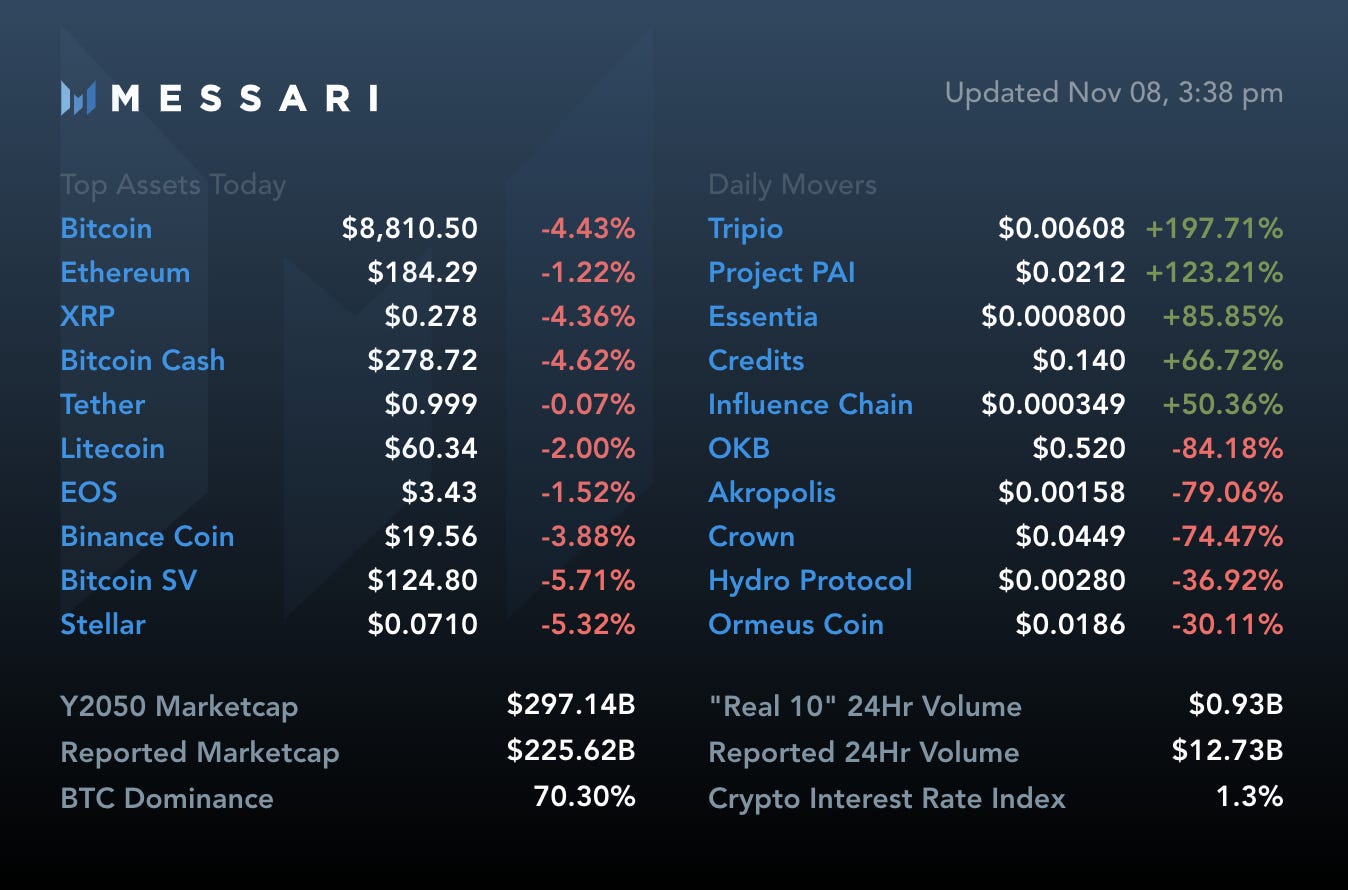
Your daily snapshot from the Messari screener.
BigCo acquiring Bloomberg to Open Up Mike’s Run?
Not intrinsically crypto, BUT:
With the news yesterday that Mike Bloomberg was entering the Presidential race, wouldn’t it be CRAZY if it also turned out Bloomberg was in talks to be acquired?
I guess if something like that were to happen, it would only be possible at the hands of a cash-rich, highly complementary competitor that could offer a high-certainty of closing. Like, maybe, Microsoft, with its $130 billion cash hoard?
Take the stickiness of the global installed base of Bloomberg terminal users, and the ubiquity of the BBG messenger application, and the company’s niche data integrations across myriad sectors; slam it together with the world’s largest professional software and analytics company…one that’s already SaaS’d its core Office product, and acquired professional services like LinkedIn and Github?
If you’re going to do a sale like that as the 88% shareholder of the seller AND you wanted to run for President, you’d probably want to marry the two events in such a way that a transaction resulted in one of two things:
Approval, which would mean a $60 billion liquidity event (or more) that put your realized liquid net worth at about 50-60x that of the temperamental would-be electoral competitor you’d face, a man who prides himself on being the #1 global businessman in the universe.
Anti-trust objections from a regulatory body ultimately overseen by your political foe, who also just so happens to have a high-profile recent history of abusing his office’s powers to target other political foes. A mega-sale now would lead to major political points (and a weakened anti-trust case) if it were stifled inappropriately.
I mean, it really would be CRAZY if that were really happening.
Right?
-TBI
Messari’s weekend reads:
The Bitcoin Reformation - Adamant Capital
The “Why”s of Optimistic Rollup - John Adler
Op Ed: In China, It’s Blockchain and Tyranny vs Bitcoin and Freedom - Alex Gladstein
A Million People Are Jailed at China's Gulags. I Managed to Escape. Here's What Really Goes on Inside - David Stavrou
Closer to Midnight: The Doomsday Clock and the Threat of Nuclear War -Garrett M. Graff
Tech and Liberty - Ben Thompson
What it means to own your data in USV co-founder Brad Burnham’s brave new world - Martine Paris
The Invention of Money - John Lanchester
Have a good weekend y’all.
P.S. Share. Subscribe. Tweet at Messari for feedback, comments, or questions.
Messari Compression Algorithm
Content and thoughts from around the web as summarized by the Messari team.
🥩 Coinbase announced all U.S. customers are now eligible to receive Tezos ($XTZ) inflation rewards. Coinbase will automatically stake (or in the case of Tezos, bake) XTZ tokens held on the exchange and distribute the inflation rewards to customers in proportion to their holdings. Previously, the exchange only offered staking-as-a-service to institutions through its Coinbase Custody branch.
Why it matters:
Governance concerns: Tezos’ on-chain governance model enables bakers to vote on upgrade proposals and determine the future direction of the protocol. By including all retail holdings in their staking total, Coinbase amassed a significant amount of voting power. Coinbase could remain neutral during on-chain voting sessions, but customers (and the protocol) would benefit if offered the opportunity to delegate votes to a baker of their choice.
Tax implications: The tax ramifications on staking rewards remain unclear. The IRS released a guideline on how the agency intends to tax crypto airdrops last month, a mere five years after its first report. Staking is still too new to receive similar guidance at this point. But with cryptocurrency gaining attention, the IRS could issue tax implications on staking rewards soon rather than take another five-year hiatus.
🚀 Smart contract platform Nervos Network ($CKB) is set to launch its mainnet on Nov. 16, following the close of its $72 million CoinList-hosted token sale. The three-week sale exceeded the project’s $50 million target and included investments from China Merchants Bank International (CMBI), Polychain Capital, Blockchain Capital, Hashkey, MultiCoin Capital, and Distributed Global.
Why it matters:
Nervos Network strives to offer a scalable Proof-of-Work (PoW) network akin to the recently launched Kadena ($KDN) blockchain, though with some notable design differences. Both projects targeted PoW because it is the only proven security model for blockchain networks, whereas the attack costs and vectors associated with Proof-of-Stake (PoS) are more theoretical.
Nervos’ CKByte (CKB) token supply represents the overall state size of the blockchain, and its issuance policy bounds state growth, enabling scarce storage resources to be priced and traded freely on the market. This design is meant to cap the disk space required by node operators to store the blockchain’s contents and limit state growth (i.e., “blockchain bloat”), an issue that is plaguing Ethereum ($ETH) in its current state.
Did I miss something?
Send me the link, your twitter handle and your best imitation compression algorithm write up. If I like it, I’ll include your bit next issue (with attribution).
Should your colleagues read daily? We now offer discounts for corporate access. Email us, and we’ll onboard your whole team.



